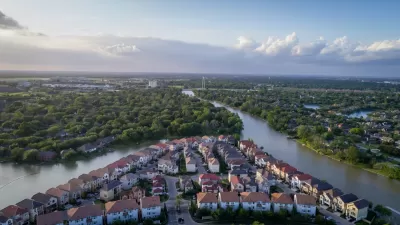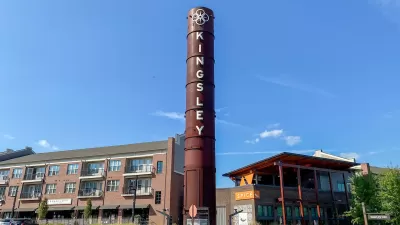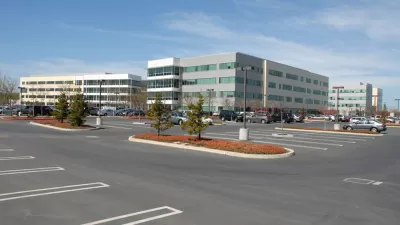Developers in Fort Bend County are drawing inspiration from ‘agrihoods’ to build car-light communities in one of the nation’s fastest-growing areas.

Fort Bend County, a rapidly growing county adjacent to Houston, Texas, more than doubled its population in the last two decades, writes John Brannen in the Kinder Institute for Urban Research’s Urban Edge blog. Now, developers building in the largely suburban and rural area are taking cues from cities to create communities with urban-style amenities that retain a connection to their rural, agricultural roots.
One development, Indigo, aims to be “an ecosystem” that connects housing, agriculture, and other uses in a compact area. “What we’re trying to accomplish is human-oriented development. When you start thinking through a humanistic lens, you start to uncover some challenges, some opportunities and some solutions,” says Indigo developer Clayton Garrett.
According to Brannen, “Indigo will feature eight housing types, with 650 units for purchase and 100 rental properties. They include cottages, three-story townhomes, duplex-style housing called “duets,” 35-foot and 45-foot alley-loaded homes with rear-facing garages and a small number of traditional 50-foot frontloaded homes — the only homes that will have driveways on the street.” Every other street in the development will be a linear park.
Indigo co-developer Snodgrass says “All of the residents’ local travel for immediate daily needs, exercise, and leisure can be handled by walking. Eighty-five percent of our homes are within a quarter mile of our town center area.” However, Snodgrass acknowledges the limitations of building a new community in an area lacking a local bus system, where residents will still need to rely on personal vehicles for longer trips.
FULL STORY: As Fort Bend becomes increasingly urban, developers see opportunity to rethink neighborhood design

Trump Administration Could Effectively End Housing Voucher Program
Federal officials are eyeing major cuts to the Section 8 program that helps millions of low-income households pay rent.

Planetizen Federal Action Tracker
A weekly monitor of how Trump’s orders and actions are impacting planners and planning in America.

Canada vs. Kamala: Whose Liberal Housing Platform Comes Out on Top?
As Canada votes for a new Prime Minister, what can America learn from the leading liberal candidate of its neighbor to the north?

Washington State’s Parking Reform Law Could Unlock ‘Countless’ Acres for New Housing
A law that limits how much parking cities can require for residential amd commercial developments could lead to a construction boom.

Wildlife Rebounds After the Eaton Fire
Following the devastation of the Eaton Fire, the return of wildlife and the regrowth of native plants are offering powerful signs of resilience and renewal.

LA to Replace Inglewood Light Rail Project With Bus Shuttles
LA Metro says the change is in response to community engagement and that the new design will be ready before the 2028 Olympic Games.
Urban Design for Planners 1: Software Tools
This six-course series explores essential urban design concepts using open source software and equips planners with the tools they need to participate fully in the urban design process.
Planning for Universal Design
Learn the tools for implementing Universal Design in planning regulations.
Central Transportation Planning Staff/Boston Region MPO
Heyer Gruel & Associates PA
Institute for Housing and Urban Development Studies (IHS)
City of Grandview
Harvard GSD Executive Education
Regional Transportation Commission of Southern Nevada
Toledo-Lucas County Plan Commissions





























